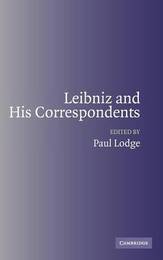
|
Leibniz and his Correspondents
Hardback
Main Details
| Title |
Leibniz and his Correspondents
|
| Authors and Contributors |
Edited by Paul Lodge
|
| Physical Properties |
| Format:Hardback | | Pages:326 | | Dimensions(mm): Height 229,Width 152 |
|
| Category/Genre | Western philosophy - c 1600 to c 1900 |
|---|
| ISBN/Barcode |
9780521834100
|
| Classifications | Dewey:193 |
|---|
| Audience | | Professional & Vocational | |
|---|
|
Publishing Details |
| Publisher |
Cambridge University Press
|
| Imprint |
Cambridge University Press
|
| Publication Date |
26 April 2004 |
| Publication Country |
United Kingdom
|
Description
Unlike most of the other great philosophers Leibniz never wrote a magnum opus, so his philosophical correspondence is essential for an understanding of his views. This collection of new essays by pre-eminent figures in the field of Leibniz scholarship is the most thorough account of Leibniz's philosophical correspondence available. It both illuminates Leibniz's philosophical views and pays due attention to the dialectical context in which the relevant passages from the letters occur. The result is a book of enormous value to all serious students of early-modern philosophy and the history of ideas.
Reviews'Often the papers do not deal simply with the doctrines discussed in the various exchanges but throw light on aspects of Leibnizian biography, and portray him as a real historical character with personal agendas, not merely as an abstract mind ... a valuable addition to Leibniz scholarship.' Roger Woolhouse, University of York 'The idea on which this volume is predicated - that we have much to gain from taking a closer look at the correspondences themselves - is therefore germane to any serious analysis of Leibniz's thought ... The result is a collection of good to excellent papers arising from a conference on 'Leibniz and His Correspondents' held at Tulane University in March 2001 and organized by the editor ... As a whole, this is one of the very best collections of papers on Leibniz to have appeared in recent years. It not only advances our knowledge of a number of philosophically rich exchanges between Leibniz and his contemporaries; it also makes a critical historiographical point regarding the necessity of studying philosophical texts by taking fully into account the genre and the context in which they were written. In doing so it helps set an important agenda for future Anglo-American research in the history of philosophy.' British Journal for the History of Philosophy
|